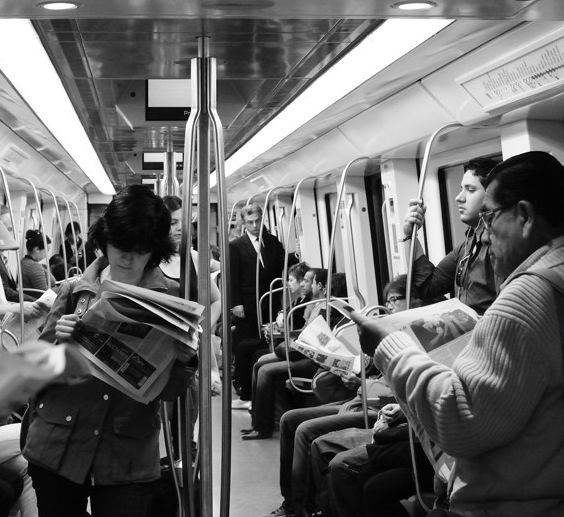
photo by Andrew _ B
by Sarada Gray
When I discovered Ideas Above Our Station, I assumed that it was a collection of railway stories. After all, there is an image of a woman on a station platform on the front cover. However, there is no sign of John Betjeman shuttling up and down a forgotten branch-line. In fact, these stories are just as likely to show airports, motorway cafés or petrol pumps, as they are railway stations. No, this is not a book about trains, but a book for trains; a book to dip into while glancing up at the arrivals board.
Unlike the cosy branch-line station with its familiar staff, the public spaces in Ideas Above Our Station are transitional and alienating. People come and go, and only the infrastructure remains. ‘I was sitting there’ – a line from the story ‘Side Exit’ by Daithidh MacEochaidh – could be the mantra of anyone within these pages.
Set in a motorway service station, ‘Side Exit’ has the ultimate landscape of impermanence. And so it is fitting that the relationship here is more about absence than presence, as is the case in many of the stories. A middle-aged man, Karl, is meeting the father he never knew in order to find out why he was given up for adoption. The third-person narration roams freely between the characters, giving us both an external and internal view of each. We begin with the thoughts of Malcolm, the father:
…he knew that he would arrive in good time despite the delays. All of this, he had clearly mapped out and accounted for almost as soon as the meeting had been agreed upon… he had known that this meeting would come.
 Though Malcolm has carefully considered the practical arrangements of the meeting, and is angry when two lorry drivers take the seats he has chosen, he has clearly given little thought to what he will say to his estranged son. As Malcolm explains that he and Karl’s mother were not planning children and that Karl was a ‘rare mistake’, Karl listens in disbelief:
Though Malcolm has carefully considered the practical arrangements of the meeting, and is angry when two lorry drivers take the seats he has chosen, he has clearly given little thought to what he will say to his estranged son. As Malcolm explains that he and Karl’s mother were not planning children and that Karl was a ‘rare mistake’, Karl listens in disbelief:
This man was a fool… this man with his Marx said this and Marx said that and dropped bombs and better worlds – this man was a joke. You never give your children up – not like that.
The encounter is not a success and, afterwards, while the more important words he could have said to his son remain unspoken, Malcolm instead chooses to speak to the lorry drivers about the taken seats, with the puerile words: “I was sitting there.” This alienating tale is carefully worked by MacEochaidh to leave the reader sharing Karl’s anger at his father’s behaviour, ‘some cold prick giving him grief for wanting… for finally wanting to know why’.
It’s a frustrating scenario when people fail to connect, and I felt a similar frustration with the narrator of ‘In Attendance’. Paula Rawsthorne’s title suggests a mourner as well as a toilet attendant and appropriately so, for June, the first-person narrator, is in effect the only mourner at her own funeral. June pretends to be down-to-earth, reflected in the internal monologue style of narration, but reading between the lines we can see she is an entirely unreliable narrator. Again, relationships centre on absence as June reflects on her dead husband, Marty, and estranged daughter, Rachel. Her refusal to admit that her husband was controlling and abusive has destroyed both her daughter’s life and her own:
Bath and bedtime… were their special time together; he used to shoo me away… but she’d get all worked up, want me to do it. Marty got terribly upset; used to say she didn’t love him. It got so bad I had to bribe her. Sometimes she’d take the treats and start creating regardless and I’d tell her Rachel, a deal’s a deal. Kids go through funny phases, don’t they?
Years later when Rachel’s boyfriend attacks Marty, June still keeps her mind firmly shut as to why: ‘[Marty] wouldn’t have the police involved. Said he didn’t want Rachel dragged into it all. He was always thinking of her.’ June’s attitude towards her marriage is similarly blinkered and disconnected: ‘Marty used to say, why do you need friends when you’ve got me?’
 But after he dies June can’t cope and, in the end, she literally buries herself alive, getting rid of her belongings and going to live in the underground toilet. As time passes, she stops going out altogether and the story ends with the chilling words she once used in sealing her daughter’s fate: ‘a deal’s a deal.’
But after he dies June can’t cope and, in the end, she literally buries herself alive, getting rid of her belongings and going to live in the underground toilet. As time passes, she stops going out altogether and the story ends with the chilling words she once used in sealing her daughter’s fate: ‘a deal’s a deal.’
James K. Walker’s story ‘Trying to Find Van Breukelen’ is also about absence, but there’s a strong relationship between the central characters. The narrator, a widower, accompanied by his son, escapes from his tedious and over-supervised job to visit his wife’s grave, in a cemetery that overlooks Nottingham. There’s a real sense of space as the characters look across ‘the whole of the city from the top of Wilford Hill crematorium’. But this story is filled with sadness, from the narrator’s self-deprecating voice. He and his son play a game of fantasy football, using the names of the dead as a way of coming to terms with their grief. They are ‘trying to find Van Breukelen’ for their team, but their game ends abruptly with the arrival of the cemetery caretaker, who shouts at them to leave so he can lock up. The story concludes on a wistful but sympathetic note:
I know he is just doing his job, and he forgets that this isn’t just any old job, but he wants to get home like everyone else on Christmas Eve and get down the pub and smoke some fags and get nostalgic about when Forest used to be good at football and County were in the same league. And I can’t hold that against him.
‘Always Swing Upright’ by Sophie Hannah was my favourite story in the collection and it is one that actually does take place on a train. The title refers to weebles – round-bottomed toys which right themselves when knocked over – and hence represents the ability to mentally ‘bounce back’. The narrator, Sonia, is en route to give the keynote speech at a conference on ‘happiness’, a theme on which she is considered an expert. As the journey progresses, in her analytical, slightly cynical style, she reflects on her likely audience:
I picture forty-odd bodies, badly-dressed, cross-legged on the floor in front of me… they will be middle-aged, and mostly women, I think. Many will recently have been abandoned by husbands or partners.
As the train heads south, she is trying to decide what has made her happy and concludes that it’s money – not money in itself, but the fact that she earns an income without having to work too hard. Sonia’s thoughtful, controlled persona contrasts with that of Greg, the aggressive man sitting opposite her:
His phone lost its signal. He slammed it against the side of the carriage so violently that I was surprised it didn’t break and yelled Fucking shite! Fuck! loud enough for everyone sitting nearby to hear.
As the journey progresses, so does Sonia’s interest in Greg – particularly the change from his relaxed and friendly manner at the start of his call – ‘Hiya mate, it’s Greg’ – and his out-of-control rage when the phone loses signal. She lends him her phone and when she goes to the toilet he takes a look at her notes:
“I read what you wrote about happiness,” he says, “thought it was good.”
[…] When I turn to look at Greg, he’s holding out a twenty-pound note.
“You can make money grow into more money, right? […] when the twenty quid’s five hundred – no, a thousand quid – get in touch, okay?”
Sonia accepts the money and ends up deciding to abandon her notes on happiness and simply tell the conference this story instead.
Ideas Above Our Station is packed with a variety of themes and voices. Some use first-person narration, some use third; some narrators are reliable and others are not. Some stories are poignant, though overall the collection is quite bleak and only ‘Always Swing Upright’ has a truly happy ending. The stories reminded me, at times, of Raymond Carver’s works, in their spareness and in the little lives of some of the characters. But in the end, they remain as British as John Betjeman standing on a station platform. You probably won’t like all of them, I didn’t, but that’s the great thing about short stories, they’re like trains. If one doesn’t suit you, another one will be along in a minute, travelling to a different destination…
~
interior train photo by Fran Simo


One thought on “Ideas Above Our Station”
Comments are closed.